|
|
|
Sort Order |
|
|
|
Items / Page
|
|
|
|
|
|
|
| Srl | Item |
| 1 |
ID:
133253
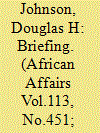

|
|
|
|
|
| Publication |
2014.
|
| Summary/Abstract |
ON 16 DECEMBER 2013 THE PRESIDENT of the Republic of South Sudan, Salva Kiir Mayardit, appeared on state television in military uniform to announce that he had successfully put down a coup attempt in the capital, Juba. The coup attempt was said to have been led by former Vice-President Riek Machar and several ex-cabinet ministers and officials of the ruling Sudan People's Liberation Movement (SPLM), including Madame Rebecca Nyanding de Mabior, the widow of the SPLM's first leader, John Garang. Eleven alleged coup plotters were arrested in their homes, but Riek Machar escaped from Juba, and, amid reports over the next few days of targeted killings of Nuer in Juba by men in uniform loyal to the President, the commanders of the 8th and 4th army divisions of the Sudan People's Liberation Army (SPLA) in Jonglei and Unity states announced their defection to Riek Machar and seized control of the state capitals of Bor and Bentiu. In telephone interviews from secure places Riek Machar denied that he had been involved in a coup but then urged the army to overthrow Salva Kiir and announced his plans to march on Juba.
|
|
|
|
|
|
|
|
|
|
|
|
|
|
|
|
| 2 |
ID:
133249
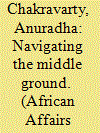

|
|
|
|
|
| Publication |
2014.
|
| Summary/Abstract |
Twenty years after the Rwandan genocide, little is known about the political values of non-elite Hutu. The post-genocide regime has emphasized the problem of "divisionism" and "genocide ideology", suggesting a popular preference for a radical stance on inter-group relations and reconciliation. This argument has been used to defer the question of democracy. This article investigates the attitudes of ordinary Hutu at a rural site, and shows that the respondents staked out a middle ground, emphasizing the shared interests of ordinary Hutu and Tutsi and distancing themselves from the political excesses of both Hutu and Tutsi elites. However, this moderate political space appeared to yield to more radical views when discussing the pressures of transitional justice, when respondents' careful distinction between elite and ordinary people collapsed and a monolithic actor, "the Tutsi", was imagined in conflict with "the Hutu". While this slippage appears to be a coping mechanism in the face of stressful situations rather than an inherent political preference, the article concludes that politically convenient assumptions and maladroit public policy risk contributing to the very dangers the regime claims to combat.
|
|
|
|
|
|
|
|
|
|
|
|
|
|
|
|
| 3 |
ID:
133252
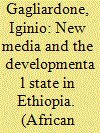

|
|
|
|
|
| Publication |
2014.
|
| Summary/Abstract |
The Ethiopian government, led by the Ethiopian People's Revolutionary Democratic Front (EPRDF), has developed one of the most restrictive systems for the regulation of new media in Africa. So far, most discussion has focused on the measures employed by the EPRDF to prevent the Internet and mobile phones from becoming tools for opposition forces to challenge the regime. Much less attention has been paid to the strategies pursued in order to make new media work in support of the government's ambiguous but ambitious attempt to make Ethiopia a developmental state. Examining the period between 1991 and 2012, this article explores how the EPRDF gradually moved from a simple strategy of information control towards incorporating new media into its state- and nation-building efforts through large-scale projects such as Woredanet and Schoolnet. Larger trends at the international level, including the securitization of development and the growing significance of China in Africa, have legitimated the use of the media to serve development outcomes, and have facilitated the spread of the kind of 'developmental media system' that has emerged in Ethiopia. The article concludes that only by engaging with these systems on their own terms and "going with the grain" can we develop a better understanding of how they work and how to change them.
|
|
|
|
|
|
|
|
|
|
|
|
|
|
|
|
| 4 |
ID:
133250
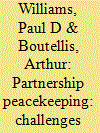

|
|
|
|
|
| Publication |
2014.
|
| Summary/Abstract |
The relationship between the United Nations (UN) and the African Union (AU) has at times been characterized by considerable conflict, mistrust, and tension, often hindering the predictability and conduct of effective peace operations. This article analyses the challenges facing UN-AU cooperation on peace and security issues and examines their partnerships in various peace operations. Specific attention is paid to the crucial cases of Somalia and Mali, which exemplify some of the positive and negative aspects of this relationship. We argue that while great power politics and the international normative context have played important roles in structuring debates about peace operations in contemporary Africa, so too have two more bottom-up factors: the specific operational and financial challenges generated by the AU's big missions in Darfur, Somalia, and Mali, and the organizational cultures and bureaucratic constraints within which both institutions have had to work. Greater focus on these bottom-up factors could bring significant improvements to the decision-making processes in Addis Ababa and New York, to operational responses, and to the conduct of peace operations.
|
|
|
|
|
|
|
|
|
|
|
|
|
|
|
|
| 5 |
ID:
133245
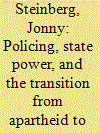

|
|
|
|
|
| Publication |
2014.
|
| Summary/Abstract |
With some exceptions, scholarship on post-apartheid policing has been too preoccupied by continuities with the apartheid era. While this is understandable, it has blinded scholars to profound changes. I argue that what has changed most since the end of apartheid is the relationship between policing and political order. During the late apartheid era, the structure and ethos of the South African Police was animated by the task of containing an insurgency. In the democratic era, policing is increasingly animated by the task of managing conflict in the ruling party. The difference is profound and the implications ripple right to the edges of the police organization, fashioning the manner in which street life is policed and impinging on the functioning and the durability of the detective service. The article concludes by arguing that instruments used in the past survive only when agents in the present find them useful, and that accounts of continuity need to train their analytical attention on the politics of the here and now.
|
|
|
|
|
|
|
|
|
|
|
|
|
|
|
|
| 6 |
ID:
133248
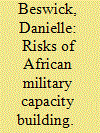

|
|
|
|
|
| Publication |
2014.
|
| Summary/Abstract |
Civil war and insecurity are widely seen as obstacles to development and threats to international stability, and donors are therefore keen to develop African capacities to manage conflict on the continent. Building the capacity of African militaries is hazardous, however, given their frequent roles in coups, support for authoritarian regimes, and violence against civilians. This article argues that the risks of military capacity building can be assessed more accurately by understanding how national governments view and utilize the military as a policy tool. It demonstrates this using the case of post-genocide Rwanda, a significant contributor to African peacekeeping but also to instability in the Democratic Republic of Congo (DRC). The article identifies four features of the Rwandan regime's understanding and use of military force, using these to explain the dual and divisive role of Rwanda's military as an agent of instability on the one hand and peace on the other. Finally, the article explores the M23 crisis, considering implications for donor efforts to manage risks inherent in international commitments to "African solutions". It concludes by arguing that, as African military capacity building continues, recognizing the ways in which such enhanced forces are likely to be used will be crucial to developing a better understanding of the continent's peace and security prospects.
|
|
|
|
|
|
|
|
|
|
|
|
|
|
|
|
| 7 |
ID:
133246


|
|
|
|
|
| Publication |
2014.
|
| Summary/Abstract |
This article addresses the social and political implications of wartime and post-war resource capture in South Sudan. It argues that predation by armed groups during the second civil war (1983-2005) initiated a process of dominant class formation, and demonstrates how, through various strategies of resource capture and kinship networks, commanders from the Sudan People's Liberation Army (SPLA) and other factions formed a new aristocracy - a "dominant class" that thinks of itself as "the best". Drawing on Marcel Mauss's analysis of 'gifts', it describes how commanders, through gifts of bridewealth and wives to their subordinates, formed a lower stratum of followers that strengthened their position. After the Comprehensive Peace Agreement, the military elite in power has maintained this lower stratum through the deployment of nepotistic and clientelist networks. The article discusses three modes through which the elite has sought to distinguish itself, showing how the elite has used the lower stratum to demonstrate its prestige and influence in the post-war period, and how the elite's ostentation and widespread corruption have triggered popular resentment in which old ethnic enmities sometimes resurface.
|
|
|
|
|
|
|
|
|
|
|
|
|
|
|
|
|
|
|
|
|